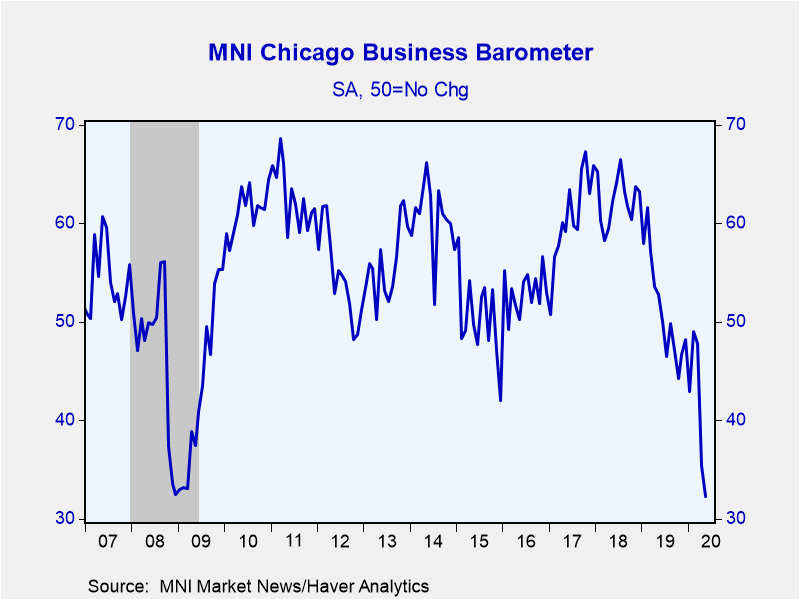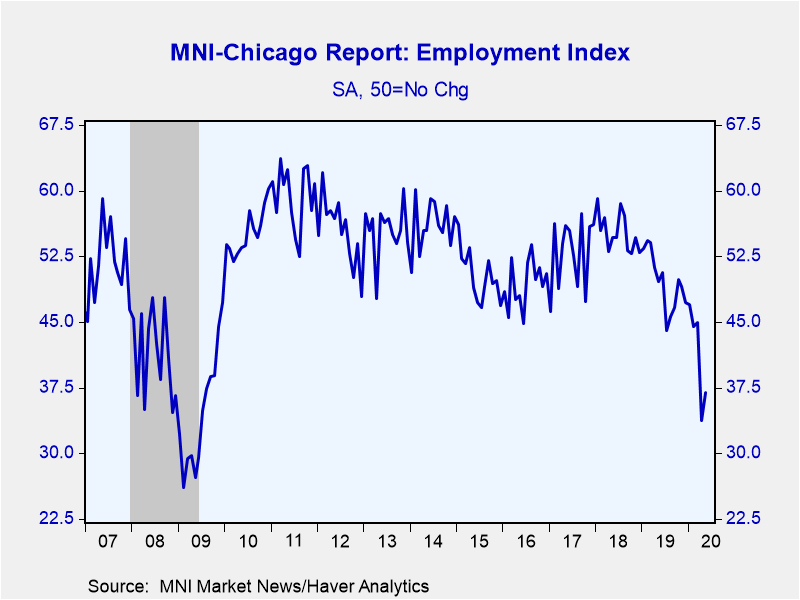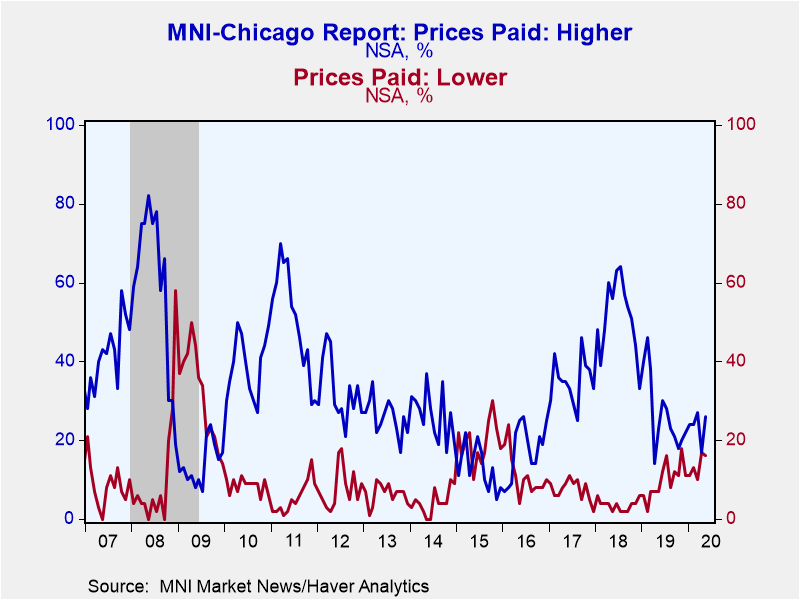 Global| May 29 2020
Global| May 29 2020U.S. Chicago Business Barometer Weakens Further During May
by:Tom Moeller
|in:Economy in Brief
Summary
• Chicago PMI fell to lowest level since March 1982. • ISM-Adjusted measure similarly weakened due to COVID-19. • Lower production & new orders continued to lead decline. The Chicago Purchasing Managers Business Barometer fell to 32.3 [...]
• Chicago PMI fell to lowest level since March 1982.
• ISM-Adjusted measure similarly weakened due to COVID-19.
• Lower production & new orders continued to lead decline.
The Chicago Purchasing Managers Business Barometer fell to 32.3 in May from 35.4 in April, continuing to reflect the depressing effects of the coronavirus on business around the world. A reading below 50 for this diffusion index suggests contracting activity in the Chicago area. The Action Economics Forecast Survey expected a reading of 36.7.
Haver Analytics constructs an ISM-Adjusted Chicago Business Barometer with similar methodology to the ISM Composite Index. This measure fell to 41.8 in May, the lowest reading since July 2009. During the last ten years, the Chicago ISM-Adjusted index has an 80% correlation with the national ISM Manufacturing Index, which is scheduled for release on Monday.
Of the five main indicators, production, new orders and order backlogs posted large declines. A fairly steady seventeen percent (NSA) of respondents reported higher orders and a greatly increased 73% reported declines. These declines were accompanied by a meaningful drop in the supplier delivery index suggesting quicker product deliver speeds. The inventory measure rose to the highest level since June of last year.
The employment index also improved slightly, but at 37.0 it remained down from a recent peak of 59.1 in January 2018. Just six percent of survey respondents reported a rise in hiring while 32% reported a decline.
The index of prices paid rose to 53.8 from 48.4, indicating some improvement in pricing power after a decline in April. A greater 26% of respondents reported higher prices, a measure that has moved sideways for a year.
The MNI Chicago Report is produced by MNI in partnership with ISM-Chicago. The survey covers a sample of over 200 purchasing professionals in the Chicago area with a monthly response rate of about 50%. Summary data are contained in Haver's USECON database, with detail including the ISM-style index in the SURVEYS database. The Action Economics Forecast Survey is available in AS1REPNA.
| Chicago Purchasing Managers Index (%, SA) | May | Apr | Mar | May '19 | 2019 | 2018 | 2017 |
|---|---|---|---|---|---|---|---|
| General Business Barometer | 32.3 | 35.4 | 47.8 | 52.8 | 51.3 | 62.4 | 60.8 |
| ISM-Adjusted General Business Barometer | 41.8 | 42.1 | 46.9 | 53.4 | 51.4 | 60.8 | 59.0 |
| Production | 23.7 | 25.3 | 44.4 | 54.9 | 51.2 | 64.5 | 64.2 |
| New Orders | 21.9 | 24.2 | 45.2 | 56.0 | 52.0 | 63.8 | 63.4 |
| Order Backlogs | 26.9 | 37.3 | 40.3 | 42.6 | 46.9 | 58.0 | 55.2 |
| Inventories | 52.3 | 48.2 | 34.6 | 51.0 | 48.7 | 55.4 | 54.9 |
| Employment | 37.0 | 33.8 | 44.9 | 49.6 | 49.6 | 55.3 | 52.9 |
| Supplier Deliveries | 74.3 | 78.9 | 65.3 | 55.5 | 55.6 | 64.8 | 59.4 |
| Prices Paid | 53.8 | 48.4 | 56.7 | 56.6 | 58.5 | 73.9 | 64.0 |
Tom Moeller
AuthorMore in Author Profile »Prior to joining Haver Analytics in 2000, Mr. Moeller worked as the Economist at Chancellor Capital Management from 1985 to 1999. There, he developed comprehensive economic forecasts and interpreted economic data for equity and fixed income portfolio managers. Also at Chancellor, Mr. Moeller worked as an equity analyst and was responsible for researching and rating companies in the economically sensitive automobile and housing industries for investment in Chancellor’s equity portfolio. Prior to joining Chancellor, Mr. Moeller was an Economist at Citibank from 1979 to 1984. He also analyzed pricing behavior in the metals industry for the Council on Wage and Price Stability in Washington, D.C. In 1999, Mr. Moeller received the award for most accurate forecast from the Forecasters' Club of New York. From 1990 to 1992 he was President of the New York Association for Business Economists. Mr. Moeller earned an M.B.A. in Finance from Fordham University, where he graduated in 1987. He holds a Bachelor of Arts in Economics from George Washington University.
More Economy in Brief
 Global| Feb 05 2026
Global| Feb 05 2026Charts of the Week: Balanced Policy, Resilient Data and AI Narratives
by:Andrew Cates










